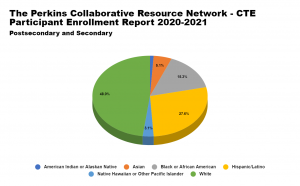This is the first in a series of blogs about the Postsecondary State Career Technical Education Leaders Fellowship at Advance CTE – Sponsored by ECMC Foundation (Fellowship), including what contextual factors led Advance CTE to establish the Fellowship and what we are learning as we lead this important work.
In 2018, Advance CTE began to explore and acknowledge the systemic issues resulting in inequity, particularly racial inequity, in Career Technical Education (CTE). Our first steps involved starting a learning journey through the Making Good on the Promise Series and our organizational equity statement approved by the Advance CTE Board of Directors, both of which anchored our initial work.
The more we learned and deepened our knowledge about systemic barriers to equitable CTE, the more intentionally we were able to center multiple dimensions of equity in Advance CTE’s work. The 2021 CTE Without Limits vision, which also serves as Advance CTE’s organizational vision, emboldens our voice and action to lead equitable CTE programs, including guiding our work to ensure every learner has access to, feels welcome in and has the supports to be successful in their chosen career pathway. More specifically, the second principle of this vision calls upon “(s)tates and institutions …. to commit to building recruitment strategies and talent pipeline programs that attract diverse CTE instructors, administrators and leaders who are demographically representative of the learners they teach.”
This call to action to address state CTE leadership representation gaps was inspired by the changing demographics of both our nation and enrollments in CTE programs. Advance CTE was formed over 100 years ago and in that time the vast majority of State CTE Directors have historically been White. Today, that is still true with just 13 percent of State Directors identifying as non-White. Yet, the learners served by the CTE community are much more diverse.

The Leaky State CTE Leadership Pipeline
The state CTE leadership pipeline, like many industries, is struggling. The coronavirus pandemic exacerbated a surge of state leadership transitions that occurred just prior to the reauthorization of the Strengthening Career and Technical Education for the 21st Century Act (Perkins V). Today, just five State Directors have seven or more years of tenure and only two have more than ten years. At Advance CTE’s 2022 Spring State Leadership Retreat, a straw poll of the attendees (all state CTE leaders) revealed that a slight majority of the participants had less than three years of experience in their roles. In fact, several state agencies experienced a 100 percent turnover of the CTE state agency team.
The cost (both direct and indirect) of these massive transitions is significant. Leadership instability often results in reduced morale, capacity, institutional knowledge and organizational effectiveness. Exacerbated by the fact that state agencies struggle with recruitment, generally, recruiting a qualified and diverse applicant pool is an even more difficult challenge. The pipeline of state CTE leadership is not always vertical; however, candidates commonly come from the local level. Given that the majority of CTE instructors are White (U.S. Department of Education, National Center for Education Statistics, Schools and Staffing Survey (SASS), “Public School Teacher Questionnaire,” 2007–08), it follows that the majority of CTE administrators are White. Therefore, current CTE leadership pipelines are systematically perpetuating representational inequities, and new solutions must be pursued to break this cycle. While Advance CTE is not directly responsible for hiring state agency staff, we are hoping to be part of the solution to strengthen and diversify the pool of applicants for state leadership positions through the Postsecondary State Career Technical Education Leaders Fellowship at Advance CTE – Sponsored by ECMC Foundation (Fellowship).
Hope for the Future
The inaugural cohort of the Fellowship, launched in November of 2021, included 15 Fellows from 13 states and 80 percent of the participants identified as members of marginalized or underrepresented populations. The second cohort, launched in September of 2022, with an additional 15 Fellows from 13 states and 72 percent of the participants identified as members of marginalized or underrepresented populations. Through a combination of intensive workshops, support from coaches and the creation of a real-world project, these aspiring leaders built knowledge, network and experience. Additionally, Advance CTE is building a suite of resources to help state leaders on their learning journey to be equity-minded leaders and to support the creation of initiatives that can expand, diversify and strengthen CTE leadership pipelines.
We hope you’ll explore more about the Fellowship and join us on the learning leadership journey. In the next blog in this series, we’ll explore what states are doing to expand, strengthen and diversify their state leadership pipelines.
Dr. Kevin R. Johnson, Sr., Senior Advisor and Kimberly A. Green, Executive Director
Read the rest of the series
Blog 2: Advancing Equity in CTE: A Review on the Current State of CTE Leadership Programs
Blog 3: Advancing Equity in CTE: The Equity-Minded Leadership Framework
Blog 4: Advancing Equity in CTE: Administrative Policy Review – An Assessment of Equitable Practices

